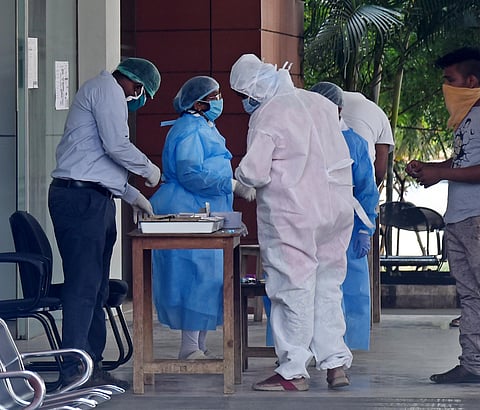

NEW DELHI: The Union Health and Family Welfare Ministry—the nodal central government department to tackle the COVID 19 pandemic—cannot emphasise enough on “over-preparedness” and “preemptive measures” to contain the public health crisis but in reality, it seems to be fumbling on many counts.
On several occasions during the last few weeks, the ministry has done a complete somersault, much to the dismay of many, and has changed the tunes on issues that have mattered the most.
On Saturday—the ministry claimed that India could have 8.2 lakh COVID-19 positive cases in the country by mid-April in a worst-case scenario in the absence of a nationwide lockdown and other containment measures, and said this number was part of “statistical extrapolation” done on the basis of different rates of growth of the disease.
Just 24 hours back, Lav Agarwal, joint secretary, who addresses a daily briefing on the outbreak on the behalf of the ministry, had said he was not aware of any such research by “ICMR”. While the source of the analysis still remains unclear, Agarwal on Saturday spent nearly 15 minutes elaborating on it.
This is not the only example. After reiterating for weeks, that not everyone should wear a mask and only those sick with an infection or suspected patients of COVID 19, their close contacts and healthcare workers treating the patients needed the protective covering, the ministry changed its stand quietly.
But that was after an empowered group on science and technology for COVID 19 under Principal Scientific Advisor to the government K VijayRaghvan and Dr V K Paul, member (health), Niti Aayog- who also heads a 21 member national task force on COVID 19 outbreak issued an advisory on homemade masks for everyone.
The same advisory was endorsed by the government a few days later—but not before Agarwal, in a press briefing when asked about the advisory first—said that the government’s stand remains the same that not everyone needs a mask.
The flip-flop by the ministry does not end there. For weeks, despite demands that India needs to ramp up its testing strategy to quickly assess the extent of epidemic progression, the government kept insisting that only those with history of international travel, their close contacts and healthcare workers treating them need to be tested for novel coronavirus.
This too was quietly revised a few days back when the government decided that everyone with influenza-like illnesses will now be tested for COVID 19 in areas defined as “hotspots”
Public health specialists watching the move meanwhile said that from the beginning, the ministry's seems to be trying to allay fear and panic, often at the cost of not offering evidence-based solutions.
“The health ministry operates under severe constraints stemming from the very little money that we invest as a country in health. However, this is just part of the problem,” said public health expert Oommen C Kurian.
“Be it the painfully slow expansion of testing, or the effort to protect our health workers with the untested hydroxychloroquine, or the inability to procure Personal Protective Equipment in time, there are many examples of the government’s over-emphasis on trying to reduce panic without really offering a solution. However, this is a long battle and I hope we learn from our mistakes and get our act together.”
Anant Bhan, an expert in bioethics and global health policy said that flip-flop decisions and messages will lead to confusion, and can indicate poor communication between arms of the government.
"The role of the ministry is crucial during a public health crisis. Besides assuming charge of the govt response, it also needs to show that it's following an evidence-based response trajectory which is transparently communicated to all relevant stakeholders. This inspires confidence in the leadership and decisions being taken," he also said.